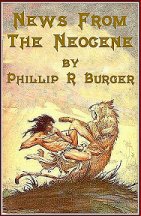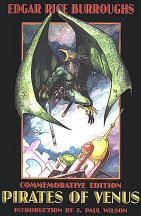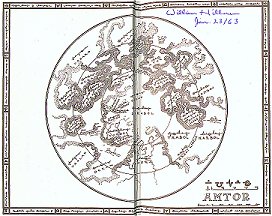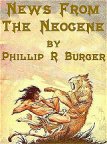
Official Edgar Rice Burroughs Tribute and Weekly Webzine Site
Since 1996 ~ Over 10,000 Web Pages in Archive
Volume 1971
Presents

 |
CARSON NAPIER by Phillip R. Burger This article first appeared as
the afterword in the
|
 |
In the pantheon of Burroughs heroes, Carson Napier is considered a tad deficient.He's a poor copy of John Carter of Mars, an incompetent boob, an accident waiting to happen, a dolt, a dullard, a dim bulb. He's cautious to the point of cowardice, he's unsure of his own abilities, and he can't even aim his spaceship in the right direction. In short, he's a complete and utter washout.
Burroughs readers are used to seeing their favorite author and his creations treated with such contempt. The strange thing is, the Burroughs readers themselves have made this assessment of Carson Napier. Self-professed "True Fans" -- those who wrap their lives around Burroughs's writings in the way Trekkers worship the words of Mr. Spock -- can't stand ol' Wrong Way Carson.
That's just fine. When I was thirteen I didn't think much of Carson either. He didn't have John Carter's fighting abilities, David Innes of Pellucidar's neo-colonial ambitions, or Tarzan's nasty attitude. Burroughs's vision of Venus -- Amtor to its inhabitants -- just didn't seem exciting enough (maybe because it was always cloudy) and couldn't hold a candle to the fantasy Mars he named Barsoom. But then I grew up and eventually realized that Burroughs as a writer had grown up as well, or at least was trying to. Written in 1931, twenty years into his career, Pirates of Venus was Burroughs's attempt to breathe some life into a well-worn field, an attempt to make his rather simple brand of science fiction relevant again. Flawed and incompetent characters peopled mainstream fiction, so Burroughs gave a nod to current literary trends with Carson Napier. At least, that is one way this former thirteen year-old justifies his adult enjoyment of Burroughs's Venus epic. As for the True Fans -- well, they will always have Barsoom.
Really, in a side-by-side comparison with Burroughs's other heroes, Carson doesn't come out as all that bad. Sure, he and his top-flight team of scientists neglected the Moon in their orbital calculations, but that's an honest blunder compared to the blind spots of other Burroughs heroes. For instance:
1) David Innes mistakes a giant winged reptile wrapped in a lion skin for his buxom cave girlfriend.No, Carson isn't cut from the same cloth as Burroughs's other heroes, thank goodness. When Carson lands on Venus sans weapons he sensibly concludes that he "could not hope, single-handed, to conquer a world" -- Burroughs's way of informing the reader that Carson Napier is no John Carter. Truth to tell, Carson's humble opinion of his talents is a pleasant alternative to John Carter's insufferable braggadocio. When the self-professed "greatest swordsman of two worlds" tells a defeated opponent that "it were no disgrace to be bested by John Carter," you rather wish some skulking enemy would creep up behind him and whack Carter on the noggin. Luckily, Burroughs rarely disappoints in this regard.
2) John Carter can never remember how many days there are in a year.
3) Tarzan fights off the barbaric charms of La of Opar, even when he has amnesia, has lost all civilized inhibitions, and can't remember his beloved Jane. Sure, Burroughs had to abide by the strict moral code of his day, but even as a 13-year-old I thought the ape-man's steely reserve in this instance a bit of a stretch. Or perhaps this merely speaks of a youthful preference for La over the fairly bland Jane.As for Carson's whole "aimed for Mars but landed on Venus" problem, remember this: dozens upon dozens of otherwise brilliant NASA scientists keep losing satellites they lob towards the Red Planet. In Carson's defense, he discovered his error right away and didn't spend any taxpayer money in his endeavor.
Yes, in spite of his shortcomings (or because of them) I like Carson Napier. I've become rather fond of Pirates of Venus as well, in spite of the novel's rather glaring fault: there's no plot. In fact, the same can be said of the entire Venus series. In the second book Carson and his lady-love Duare are Lost on Venus -- which pretty much sums up the plot. Later on they make their Escape on Venus -- which pretty much sums up the plot. There is no major villain with whom the hero does battle (Moosko the Ongyan is introduced late in the first book and abandoned rather quickly in the second). Creatures and creations like the klangan are brought in to move the story along and then shuffled off the stage. Characters and situations like Carson's good friend Kamlot and the pirates of Pirates are introduced and then dropped. With a topsy-turvy sense of geography countries are very much isolated and have little social intercourse. Amtor has no geopolitical unity and so doesn't seem to be a cohesive creation, which only exacerbates the series' lack of direction. Burroughs's novels are tales of discovery, wherein the hero finds himself in a previously unknown world and spends a great deal of time and energy battling hostile flora and fauna while he sees the sights. But in addition to rescuing the princess and winning her love Burroughs gives his heroes some kind of goal: David Innes must free the humans of Pellucidar from their reptilian overlords; John Carter must free the city-state of Helium from its besiegers. By the time Carson Napier becomes one of the titular pirates of Venus Burroughs should have come up with something resembling a plot. All Carson expresses an interest in doing is traveling about to visit the many lands of Amtor. Burroughs obliges, with a new city or country introduced every few chapters, with little to connect it with the previously visited city or country.
If John Carter had been in Carson's sandals he would have vowed to overthrow the upstart Thorist government and restore the Vepajan monarchy. Carson doesn't come anywhere near Thora; the most he hopes to accomplish is restoring Duare to her father, she being the sole heir to the Vepajan throne and "the hope of a world." When this goal is reached at the conclusion of Carson of Venus, the loving couple reconciles their personal feelings with their societal obligations by hightailing it out of Vepaja, thereby ensuring the dynasty's extinction and the eventual collapse of Vepajan society. We are a long way away from the morally righteous John Carter and his duty-bound Martians!
What a difference twenty years makes. When Burroughs first breathed life into John Carter and Tarzan back in 1911 Americans were confident about their place in the world. The country had become an economic Juggernaut, had recently "liberated" several overseas territories and was governing the locals until such time as they could govern themselves, and was above the petty disagreements of the European community. Such brash American-ness can be found in Burroughs's early fiction, wherein a modern civilized man in a primitive land battles and wins against overwhelming odds; the simple natives recognize the hero's superiority and make him their leader. Our hero sets up an empire, combining civilized skills with primitive virtues under a sort of benign dictatorship. Peace reigns and everybody has what they want. Until the sequel.
Fast forward to 1931 and things are very different. The Great Depression is in full swing, the fabric of society appears to be crumbling, and no one seems to have learned anything from the Great War. The benign dictators of Europe who offered to solve all their followers' problems proved to be anything but benign, which in time would lead the world to an even more calamitous war. With the world in a state of such economic and political turmoil Burroughs may have felt that writing about another god-like hero who becomes the savior of a planet to be out of fashion. Carson has no desire to carve out an empire in the howling wilderness, nor is Amtor a world for the taking; no one can find their way around the place, even when they divide everything by the square root of minus one.
There were also changes in Burroughs's personal life to consider. Back in 1911 he discovered his calling as a writer; more important was the knowledge that he would now be able to properly support his young wife and their two children (soon to be three). By 1931 Burroughs's marriage was almost at an end; in a few years he would turn around and marry a woman half his age, a family friend, a relationship that would strain the ties with his children. The old sense of duty and loyalty had to give way to Burroughs's more personal interests. The newly married couple would eventually move to Hawaii where Burroughs would maintain a heavy social calendar in order to appear youthful to his young bride. The couple would never stay at any one address for long until this marriage, too, ended.
Now consider Carson. He is love struck with a girl ten years his junior -- much is made of the fact that she is under legal age (by Amtorian standards) and quite virginal. They travel from place to place, the plot and pacing of the novels resembling a Saturday matinee serial. A similar criticism can be made of the later Tarzan and Pellucidar books as well. But what keeps the Venus series interesting and compensates for the series' general lack of direction, at least for the first three books, is watching how Carson and Duare work out their romantic problems; their course to true love is probably the most torturous in the entire Burroughs canon. Burroughs seems genuinely interested in making Duare more than just a kidnap victim. While Duare receives her required allotments of abductions, she does an exemplary job of saving Carson's bacon on more than one occasion. In Lost on Venus she pulls Carson out of a cannibal barbecue and from the jaws of a hungry serpent. Plucky little gal, that Duare!
Now, Carson was not the first Burroughs hero in need of rescuing. But in being snatched from the jaws of a serpent by a young girl -- a one-eyed serpent at that -- it seems that Burroughs is making more than just an off-color joke at Carson's expense. Carson is far from being the greatest swordsman of one world, let alone two. An attempt to be Tarzanic in Lost on Venus -- battling barehanded an Amtorian bull -- results in his undignified propulsion into a nearby tree. While the political satire of the Venus books is fairly straightforward -- the communist Thorists of Pirates, the Nazi-like Zani of Carson of Venus -- the Amtor saga also serves as a light-hearted parody of Burroughs's own work. Burroughs never wanted Carson to ape John Carter's heroics; he wanted Carson to be the polar opposite. John Carter declares his defiance of a hostile world with the challenge "I still live!" Carson changes this exclamatory declaration into a question when he remarks, "Each morning that I awoke on Venus it was with a sense of surprise that I still lived." There's more than one way to be heroic. Carson's just involves getting the tar whupped out of him on a regular basis.
In our current politically correct climate wherein we criticize our ignorant ancestors for not being as enlightened as us, much has been made of Burroughs's propensity for presenting white Anglo-Saxon males as the lords of creation. Tarzan will never be able to live down the fact that his name means "white skin." But by the 1930s Burroughs's Victorian notions of fine breeding and noble blood, which were part and parcel of so much of his fiction, had been dulled enough to be made fun of, again, at Carson's expense. Tarzan's "uncouth and savage training" could not eradicate his innate aristocratic bearing, something programmed into his genes. John Carter is a Southern gentleman, a landed aristocrat with the fighting blood of Virginia coursing through his veins. Carson Napier comes from a seemingly good family -- his parents were a British army officer and a Virginia woman -- but he possesses something that would mortify any other Burroughs hero: bad blood.
Shortly after dropping into the tree city of Vepaja Carson receives a blood test, the results of which show that Carson's blood constitutes "a menace to the continued existence of human life on Amtor." Burroughs elaborates upon that joke more fully in Lost on Venus wherein Carson stumbles upon the eugenic Utopia of Havatoo. Here the social Darwinist prejudice towards fine breeding has been carried to a scientifically rational conclusion, the result being a beautiful city inhabited solely by beautiful people, a people who need no man-made laws because all citizens are conversant with the natural laws of proper human behavior. Carson is tested again, which reveal him to "possess inherent psychological faults" and "inherited expressions, complexes, and fears"; it is decided that "it would best serve the interests of humanity" if Carson were destroyed. Carson finds it a tad unjust that he should die "simply because one of my ancestors failed to exercise a little intelligence in the selection of his bride." Burroughs does eventually tell us the name of one of Carson's deficient ancestors: Deacon Edmund Rice, who by a coincidence also happens to be an ancestor of Edgar Rice Burroughs.
Carson gets out of that scrape, of course, but you will just have to read the story to find out how. In the 1932 Writer's Digest article "The Tarzan Theme" Burroughs observed, "We would each like to be like Tarzan. At least I would; I admit it." That confession made, the Venus books suggest that if Burroughs ever found himself the hero of an interplanetary romance he'd be Carson Napier. Carson Napier is no John Carter, but why would he want to be? Really, John Carter possesses the ability to astrally project himself to any planet at will, and when his princess is kidnapped and taken to Jupiter or one of the moons of Mars he has to follow in a spaceship? It's time for the Warlord of Mars to rest his brawn and exercise his brain. If I had to throw in my lot with any Burroughs hero I would follow Carson Napier any day; chances are I would live longer.
1Carson inexplicably develops a John-Carter-style chip on his shoulder and a certain moral smugness in Escape on Venus that had not been present before. When enslaved, Carson expects his captors to accord him the respect due a person of his station; when in battle, he takes delight in mowing the enemy down; in assessing the assorted nonhuman races that he encounters, he defines them as freaks of nature and of a lower social order. In short, Carson is a real jerk. The answer for this sudden character shift may be in the writing schedule Burroughs followed. Written in 1940, Escape on Venus comprises four novellas; he wrote them concurrently with the four novellas that comprise the Mars adventure Llana of Gathol and the inner-world book Savage Pellucidar. Burroughs wrote one Venus story, one Mars story, and one Pellucidar story, and then started all over again until he had written twelve stories in all. This might have kept things interesting for Burroughs, but the result is three books that share a uniformity of plot, pacing, and characterization, none of them terribly successful. Escape on Venus is bottom-of-the-barrel Burroughs.

Click for full-screen map image
Back to the 
Contents Page


WEBJED:
BILL HILLMAN
Visit
our thousands of other sites at:
BILL
AND SUE-ON HILLMAN ECLECTIC STUDIO
All
ERB Images© and Tarzan® are Copyright ERB, Inc.- All Rights Reserved.
All
Original Work ©1996-2007/2010 by Bill Hillman and/or Contributing
Authors/Owners
No
part of this web site may be reproduced without permission from the respective
owners.